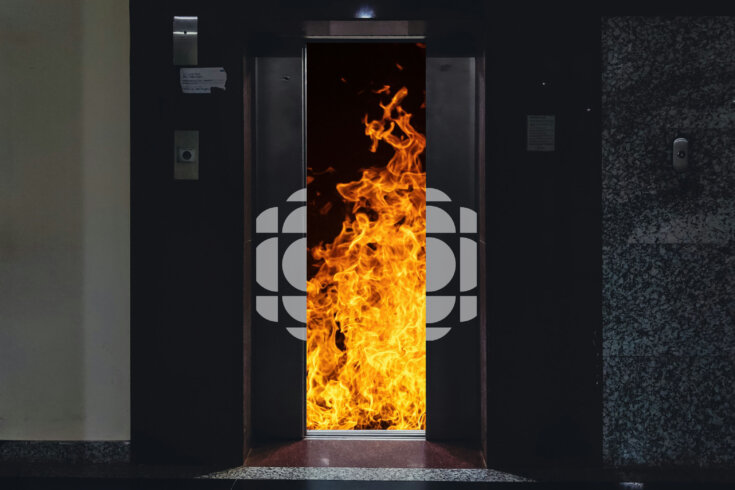“End the madness. Recall the committee. Defund the CBC.” Credit where it’s due to Pierre Poilievre and the Conservatives for writing for radio, as I was taught at a CBC skills course many years ago: short and sharp, three beats, implied subject-verb-object.
The Tories are mad for this gimmick: axe the tax, build the homes, bring it home, fix the budget, stop the crime. It’s addictive and direct and Trumpy, apt to “win the vote” for them, and thus presenting, among other things, a direct existential threat to the CBC. It’s a threat that, starting this month, Catherine Tait, the outgoing president, CEO, and poster-person for bloated bureaucracy, gets to pass on to her successor, Marie-Philippe Bouchard, who hasn’t ticked off anyone significant—yet.
The quote I opened with is from Conservative MP Rachael Thomas of Lethbridge, shadow minister for Canadian Heritage, who will oversee the dismantling of the CBC in a Poilievre government. The “madness,” as Thomas framed it on social media in August 2024—the preferred means of communication for Conservative MPs in place of journalism—is $18.4 million in bonuses for 1,194 employees and executives as approved by the CBC/Radio-Canada board of directors for the past fiscal year. This likely included a bonus for Tait, who defended the decision, reportedly claiming that CBC executives and managers are paid about half what they would be for the same private sector positions.
In October, the House (in fact, the Bloc, New Democratic Party, and Conservative members) agreed to call back the heritage committee for another go at the question: Do CBC managers deserve this bonus in light of cutbacks of hundreds of jobs last year? “While Canadians struggle to afford basic necessities like food and rent,” Thomas said in the same social media post, “CBC executives are rewarding themselves . . . despite their failing performance.” The MPs also asked the committee to invite Bouchard, who appeared before it in November.
What does “failing performance” mean? The ground is thick with surveys on the CBC and what Canadians think of it, but it’s also a question of how we judge and reward bureaucrats in civil society. Short answer: it depends on who you’re talking to. To a free-market advocate, rewards signify value in the private sector, while the public sector—which generates no shareholder wealth—is invariably regarded as overpaid and disposable. (Consider the new American promise to pull trillions out of the federal budget, led by Elon Musk and Vivek Ramaswamy: this is an ideological exercise in slashing labour.)
For an economist, performance is neutral, apolitical, and quantifiable: Tait’s salary range is reportedly between $468,900 and $551,600, with a bonus between 7 and 28 percent, according to CBC reporting. So her perfomance pay can run anywhere from $33,000 to $154,000 at the top end if she meets “targets” set out by Canadian Heritage (which has refused to say if those targets have been met).
Yet what are the cultural costs of claiming those bonuses? Tait may have been fully and technically due hers, but she was sadly tone deaf on how the issue has added noise to the “Defund the CBC” clamour on the Conservative side of the House. Is it worth the money, say, to buy the nice boat but be haunted by the ghosts of Wayne and Shuster forever?
In 2023, the Globe and Mail editorial board told its readers that CBC TV had “lost its relevance.” According to the corporation’s own third-quarter report, digital reach (based on the number of visitors to the CBC monthly) was “trending below target.” In a time of streaming, the broadcaster’s prime-time share of 4.4 percent speaks to the end times of broadcast TV or the remarkable lack of interest in CBC prime time—or both. The Canada Media Fund says that Netflix dominates streaming viewers (2024 numbers) with 62.9 percent of English viewers, while CBC Gem, the corporation’s streaming app, has 9.3 percent. (Crave, the streamer for Bell Media, had 14.2 percent.)
Stuck in the mortar between the numbers is the fact that Rosemary Barton Live and the CBC Calgary supper-hour news show can’t compete with the likes of Squid Game—but that one bears community value in Canada and the other doesn’t. However, any message that the CBC exists for Canadians to “tell Canadian stories to each other from coast to coast to coast,” or words to that effect (the same greeting-card sentiment on every CBC mission statement I’ve ever read), is long past the best-before date. In any case, is Tait’s performance really bonus-worthy?
A new study by McGill University’s Centre for Media, Technology and Democracy says that 78 percent of Canadians would like to see CBC/Radio-Canada continue if it addresses its major criticisms (my italics), and that includes 47 percent of self-described conservative respondents who would keep or increase its funding. Only 11 percent of the respondents were in favour of outright defunding of the CBC.
What major criticisms? About 27 percent said the CBC is too “woke,” irrelevant, and biased in its reporting. All are subjective measures of performance: one’s defence of civil rights is another’s woke. Amplifying the voices of the marginal is what journalism does, but it makes some people itchy. In any case, “woke” can’t be quantified.
Biased? The Toronto Sun claimed that a “secretive committee” surveilled and censored CBC coverage of the Middle East—which George Achi, director of journalistic standards and public trust for CBC News, went to some lengths online to debunk. It’s been a common trope as long as there’s been a CBC: star chambers, political interference, wizards guiding news policy. In any case, there are written Journalistic Standards and Practices, which, in theory, iron out individual editorial biases in the newsroom. The problem: no one wins a highly charged rhetorical battle by asking angry people who believe in “covert committees” to read the Journalistic Standards and Practices.
In this political climate, people believe the CBC is run by Marxists, but only 11 percent of the whole want the CBC to be cut entirely. So how can Poilievre hang a significant piece of the Tory agenda on such a small cohort? Poilievre’s base is brought to the polls on a range of wedge issues, of which the CBC is only one. But terms like “woke” and “bias” are emotionally engaging enough, even entertaining enough, to provoke the right people who, surveys aside, are looking to settle a range of imagined social and cultural scores. In this way, “Defund the CBC” is just a flavour enhancer for the Conservative Kool-Aid, but the result will be the same whether 11 percent or 89 percent approve of it: he has to kill the CBC, he has to, or ditch his own credibility with a hungry and exercised electorate. It will happen. Not the French side, but English CBC will be gone.
So what can Bouchard, the new president, do? She is the first francophone woman to head CBC/Radio-Canada. She served almost thirty years in management roles at Radio-Canada before being named head of TV5 Québec Canada, a Montreal-based nonprofit that features international francophone entertainment and talk programming, in 2016. She was a member of the heritage minister’s Advisory Committee on the Future of CBC/Radio-Canada, which dealt with the corporation’s evolving mandate.
The inside scoop on Bouchard is refreshingly wait-and-see: a source in production at the corporation says she “isn’t well known . . . but, unlike Tait, is unlikely to sully [the CBC’s] reputation with missteps, ego, and managersplaining.” There are advantages to coming in from nowhere, but that’s been the case with almost every CBC president except Henry Perrin Beatty, who was a cabinet member in the Brian Mulroney government before taking on the role in 1995 (appointed by Jean Chrétien, oddly enough).
When I worked at the CBC, presidents were like Brigadoon: they only appeared every few years out of the mist, before parliamentary committees, and one never met them in person, only heard tell of them through oral mythology: Juneau, Veilleux, Manera, Beatty. It’s like a medieval Coptic chant. And it’s not a plus, right now, to be in the shadows, obscure and presumed bureaucratic. Bouchard might do well to drive a proactive and simple message: axe the bonus, ditch the hysteria, save the country, fund its voice.
The evolving autocratic politics of Hungary, Philippines, India, and of course the United States suggest that the mannered tranquility, and hush-hush “trust us” message, of liberals and Liberals is done. The politics of loud fanaticism is here at home too. Meanwhile, the CBC is fighting for its life. Imagine what its place will be in a fractured media environment with no public funding. It can be done: focus on intensely local news (including parliamentary) as a non-profit, donation-based service living lean, covering that which private, for-profit media has no interest in. Make it technically nimble: audio and online only.
The McGill study says only 40 percent of rural Canadians are satisfied with their local coverage: there’s room for growth, for goodwill, for making friends, for finding new money. Is Bouchard interested in a smaller, stronger CBC? That would surprise the loud fanatics.





